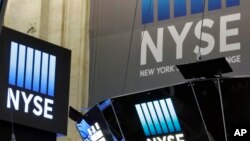U.S. stocks closed out Friday's session at the highs of the day following a historic week in trade, with the Dow Jones industrial average closing at a record high, up 5 percent on the back of Donald Trump's stunning upset victory in the presidential election and the Republican Party's control of both houses of Congress.
This was the best performance for the Dow in five years and the best week for the S&P 500 since October 2004.
Despite the market's overall performance, crude oil prices dipped by 3 percent, with traders focusing on supply and demand fundamentals, which continue to be stretched.
The Organization of Petroleum Exporting Countries reported an increase in October production to a record high. This was led by members hoping to be exempt from any OPEC attempts to curb supply at the group's next meeting in Vienna on November 30. Based on the continuing high level of production, which has kept prices down, a larger global surplus is expected next year.
Trump rally
The S&P 500 index came into this week riding a nine-session losing streak, its longest since 1980, while the VIX, which measures fear and uncertainty in the market, had been up for nine straight sessions as of last Friday.
That all changed once traders absorbed the election news. In the first hours after the polls closed Tuesday night, overnight futures prices fell precipitously, but by Wednesday morning's opening, trading was back on the upside.
Among the week's highlights: the Dow soared more than 250 points Thursday to an all-time closing record. The previous week's losing streak turned around completely, with an upward spike of nearly 1,000 points in four days. That was the best four-day point gain since an 1,174-point climb in late November 2008.
"Within a week, the market went from egregiously oversold to overbought," said Adam Sarhan, CEO of 50 Park Investments. "Market participants [this week] managed to repair all the damage done during the nine-day losing streak."
Contrary to earlier predictions of a a significant pullback following Trump's election, Brad McMillan, chief investment officer for Commonwealth Financial Network, listed three reasons why the markets spiked:
1. The nine-day pullback before the election certainly was pricing in some probability of a Trump win. When he actually won, the uncertainty risk disappeared. That alone could have driven markets back up.
2. A Republican sweep may have been perceived as positive for business and the economy.
3. Markets tend to sell the rumor and buy the news, and this could have been just a normal reaction.
Will euphoria continue?
There will be pockets of volatility as the markets digest Trump's domestic and foreign policy initiatives, the Fed, interest rate cycles, inflation growth, and the natural ebbs and flows of the economic cycle.
Although early market strength after an election is unusual, and certainly caught many insiders off guard, analysts at LPL Financial said there was no sign that it meant much in the longer term, either positive or negative. Those seeking longer-term returns should continue to focus on valuations and fundamentals, the analysts said.
At the end of the day, corporate America is adaptable. Over the past 80 years, many disruptive policies have come and gone — as have recessions, periods of high inflation, interest rate spikes, Federal Reserve rate-hike cycles, wars and terrorist attacks. Through it all, S&P 500 companies have grown profits by an average of 8 percent annually.
Trading week ahead
Trump's transition and policy initiatives will continue to dominate headlines, but attention will also swing back to the Federal Reserve, which could raise interest rates on December 14. Chair Janet Yellen is set to appear before the Joint Economic Committee on November 17, and more than a dozen other Fed officials are due to speak during the coming week.
Data on inflation, housing, manufacturing and consumer spending will also draw plenty of attention.
Earnings from consumer-related companies will set the tone for the key holiday sales season. The National Retail Federation expects retail sales in the U.S. for November and December (excluding autos, gas and restaurants) to increase a solid 3.6 percent to $655.8 billion, significantly higher than the 10-year average of 2.5 percent and above the seven-year average of 3.4 percent since the recovery began in 2009.
Key companies set to report include: Dick's Sporting Goods, Home Depot, TJX Stores, Lowe's, Target, Limited Brands, Best Buy, J.M. Smucker, Wal-Mart, The Gap, and Abercrombie & Fitch.






